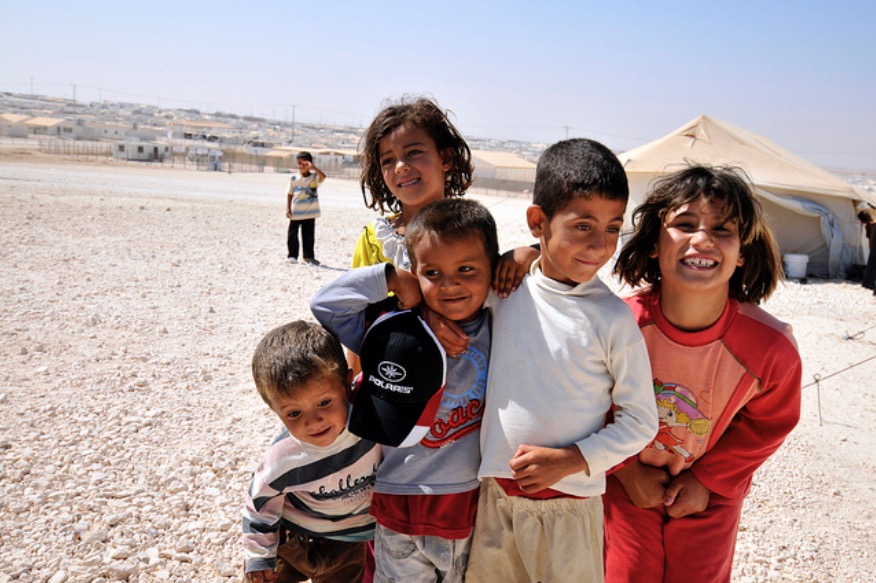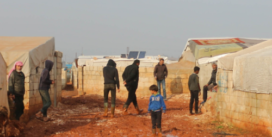- Fall Newsletter, 2025, Issue 15
- Using International Online Learning Modules to Engage Students in the Study of Critical Global Issues
- Upcoming Book Launch: Hearts of Freedom
- Announcing winners of the 2025 CARFMS Essay Contest
- The New York Declaration for Refugees and Migrants and its two Global Compacts: Addressing the Symptoms or the “Root Causes” of Forced Displacement?*
The UN Refugee Agency’s report shows that Canada should welcome more refugees, by Didem Dogar
In June 2018, the United Nations High Commissioner for Refugees (UNHCR) published its annual Global Trends report on forced displacement in 2017. According to the Global Trends report, how well did Canada do in welcoming refugees compared to other countries in the world?
Actions speak louder than words
First of all, despite their limited economic resources developing countries mostly and by far welcomed the greatest number of refugees. According to the report, the top welcoming refugee countries are, respectively, Turkey – with 3.4 million for the fourth consecutive year -, Pakistan, Uganda, Lebanon – hosting the largest refugee population per capita – and Iran. Only after them, Germany comes in with a large number of 970,400 refugees. In fact, Germany is the only country in the developing world, which made it in the top-10 list of refugee-hosting countries.
Zaatari refugee camp, Jordan, by Foreign and Commonwealth Office , (CC BY-ND 2.0)
Where is Canada in this picture?
The numbers are confusing, particularly compared to Canada’s “zero tolerance policy” southern neighbor, the United States. The good news is that Canada is ranked second out of 32 resettlement countries in 2017 following the United States, emphasizing the importance of offering durable solutions such as resettlement or integration. Interestingly enough, Canada resettled a slightly lower number of 26,600 refugees, compared to the US, which resettled 33,400 refugees. The number of refugees who were naturalized in Canada also declined in 2017 and reached only 10,500, the lowest number since at least 2013.
Canada is ranked 31st in the world, 9th in the developed region
In the world, Canada only became the 31st largest refugee-hosting country. Among the countries within the developed region, Canada got the 9th place, which puts it behind Germany, France, the US, Sweden, Italy, Russia, the United Kingdom and Austria. However, the number of asylum claims in Canada more than doubled compared to those of 2016, and Canada became the ninth largest recipient of new asylum applications in 2017. To put it into a broader perspective though, there were 1.7 million new asylum claims worldwide in 2017 and among those claims, the US “was the world’s largest recipient of new individual applications.” In 2017, nationals of Haiti (7,300), Nigeria (5,500), Turkey (2,200) and United States (2,100) constituted the largest asylum seeker applicant groups in Canada. By the end of 2017, Canada recognized almost 105.000 refugees and there are nearly 52,000 asylum seekers waiting for decisions.
What does all this tell us? Resettling more refugees to Canada is not only a moral duty but also necessity.
Considering all these numbers, is Canada doing well in opening its doors to refugees? The answer depends on where we look from. On a national level, last year, Canada accepted more asylum seekers than any time in at least a decade. Besides, Canada embraced a more welcoming tone towards refugees, restored the healthcare coverage for refugees and claimants and dropped lawsuits against asylum seekers/refugees. Thus, in the last two years, Canada did relatively well in welcoming refugees in comparison to its approach in the previous years and, especially, in comparison to the Trump Administration’s policies in the US.
However, on a global level, Canada’s position does not seem as positive. Hosting the 31st largest refugee population in the world – well behind the U.S, Germany, France, Chad, Kenya, and Pakistan-, Canada is far from these other countries in welcoming refugees worldwide in terms of hosting them in its territory. It is true that Canada is not a neighboring country to war zones, but neither are many other countries such as Germany or France.
UNHCR estimates that 1.2 million refugees needed resettlement in 2017. Canada resettled only 26,600 of them; though, it has the capacity and size to resettle many more refugees than the current or anticipated numbers. If developing and, especially, the least developed countries can host the world’s largest refugee population, Canada can resettle more refugees. [Hosting refugees (often long term) can be considered as a temporary situation. However, due to the protracted war situations and low resettlement quotas, local integration has become only feasible option for neighbouring countries.] The reality is that the majority of refugees are never resettled. They are forced to sustain their lives in ill-conditioned refugee camps for years and depend on humanitarian aid. As put forward by Serena Parekh, “[t]his is one of the most serious and underappreciated injustices in our world.”
Resettling more refugees to Canada is not only a moral duty but also a necessity. In fact, by adopting the New York Declaration for Refugees and Migrants, Canada committed itself “to a more equitable sharing of the burden and responsibility for hosting and supporting the world’s refugees”. Our moral obligations towards those most vulnerable, the world’s refugees, and Canada’s commitment to a more equitable sharing of responsibility towards them suggest that it is time for Canada to step up to its commitments and resettle more refugees into its territory.
Didem Doğar is a doctoral candidate and a teaching fellow at McGill University Faculty of Law, and a research affiliate with the Refugee Law Initiative of the University of London. Previously, she worked at the UNHCR in Turkey and at the Council of Europe’s Venice Commission in Strasbourg.

